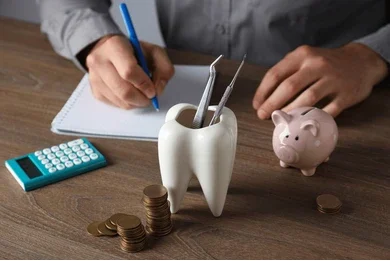Does That Tooth Really Need a Crown? Here’s How to Know for Sure
Not sure if you actually need a crown? We break down the real signs, the best (and worst) crown materials, and what to expect so you don’t end up overpaying for unnecessary work.
Do You Actually Need a Crown Or Is Your Dentist Just Overdoing It?
You’ve probably heard it before: “You need a crown.” But do you really need one? Or is there another option that could save you time and money?
The truth is, dental crowns are essential for restoring damaged teeth, but they aren’t always necessary. Before you commit, it’s important to understand when a crown is truly needed, what materials work best, and how to avoid unnecessary dental work.
Let’s break it all down so you can make the right choice for your smile—without overpaying for treatments you don’t need.
How Do You Know If You Need a Crown?
A dental crown is a custom cap placed over a damaged or weakened tooth to restore its shape, strength, and function. But how do you know if a crown is necessary?
✔ Large Cavities or Severe Decay – If a filling isn’t enough to repair the damage, a crown helps protect the remaining tooth structure.
✔ Cracked or Broken Tooth – A tooth that’s chipped or fractured may need a crown to prevent further damage.
✔ After a Root Canal – A root canal weakens the tooth, making a crown necessary for protection.
✔ Severe Tooth Wear – If grinding or acid erosion has worn down your teeth, a crown can restore strength and function.
✔ Replacing a Large Filling – A filling only lasts so long. If a tooth has had multiple fillings, a crown may be a better long-term solution.
💡 Not sure if you actually need a crown? Ask your dentist about less invasive options like onlays, inlays, or bonding, which can sometimes repair a tooth without covering the whole thing.
The Best (And Worst) Dental Crown Materials
Not all crowns are the same. The material you choose affects durability, cost, and aesthetics.
✅ Best Crown Materials:
✔ Porcelain (All-Ceramic) – Looks natural, great for front teeth, but may wear down opposing teeth.
✔ Porcelain-Fused-to-Metal (PFM) – Stronger than all-ceramic but can show a dark metal line over time.
✔ Zirconia – Super durable, great for back teeth, and blends well with natural teeth.
❌ Materials to Avoid (In Most Cases):
🚫 Gold Crowns – Very durable but not aesthetically pleasing. Some people love them, but most prefer tooth-colored options.
🚫 Stainless Steel – Temporary solution only (often used for kids’ crowns).
What to Expect During a Dental Crown Procedure
Getting a crown usually takes two visits, but same-day crowns are available at some offices.
🦷 Step 1: Tooth Preparation
✔ The dentist removes any decay, old fillings, or damaged areas.
✔ The tooth is shaped to fit the crown properly.
✔ A temporary crown is placed while your permanent one is being made.
🦷 Step 2: Permanent Crown Placement (2-3 weeks later, unless using same-day crowns)
✔ The temporary crown is removed.
✔ The permanent crown is bonded in place with dental cement.
✔ Your bite is checked, and adjustments are made if needed.
Healing Time: Most people adjust to their crown within a few days. You might experience mild sensitivity, but this usually fades quickly.
How Long Do Dental Crowns Last?
With proper care, a dental crown can last 10-15 years or more. Zirconia and gold crowns tend to last longer than porcelain or PFM crowns.
To extend your crown’s lifespan:
✔ Brush and floss daily to prevent decay around the crown.
✔ Avoid chewing hard foods (ice, nuts) on the crowned tooth.
✔ Wear a night guard if you grind your teeth.
Final Thoughts: Do You Really Need That Crown?
✔ If your tooth is weak, cracked, or has had a root canal, a crown is the best option.
✔ If the damage is minimal, a filling or onlay might be a better alternative.
✔ Choosing the right material makes a difference in durability and appearance.
🚀 Still not sure? Book a consultation today and find out if a dental crown is truly necessary for your smile!
Dental Crown FAQs
1. Does getting a dental crown hurt?
The procedure isn’t painful since local anesthesia is used. You may have mild soreness or sensitivity for a few days after.
2. How much does a dental crown cost?
The average cost of a crown is $800–$2,500 per tooth, depending on material and location.
3. Are dental crowns covered by insurance?
Most dental insurance plans cover a portion of the cost, especially if the crown is medically necessary.
4. Can I get a crown instead of a filling?
Not always. If the damage is minimal, a filling may be enough. However, if the tooth structure is compromised, a crown is the better option.
5. What’s the difference between a crown and a veneer?
✔ Crowns cover the entire tooth for strength and protection.
✔ Veneers only cover the front surface for cosmetic enhancement.
6. How long does it take to get used to a dental crown?
Most people adjust within a few days, but it can take up to two weeks for it to feel completely normal.
7. What foods should I avoid with a dental crown?
Avoid hard, sticky, or extremely hot/cold foods for the first few days after placement.
8. Can a dental crown fall off?
It’s rare, but it can happen if the cement weakens or you bite into something too hard. If it happens, see your dentist immediately.







